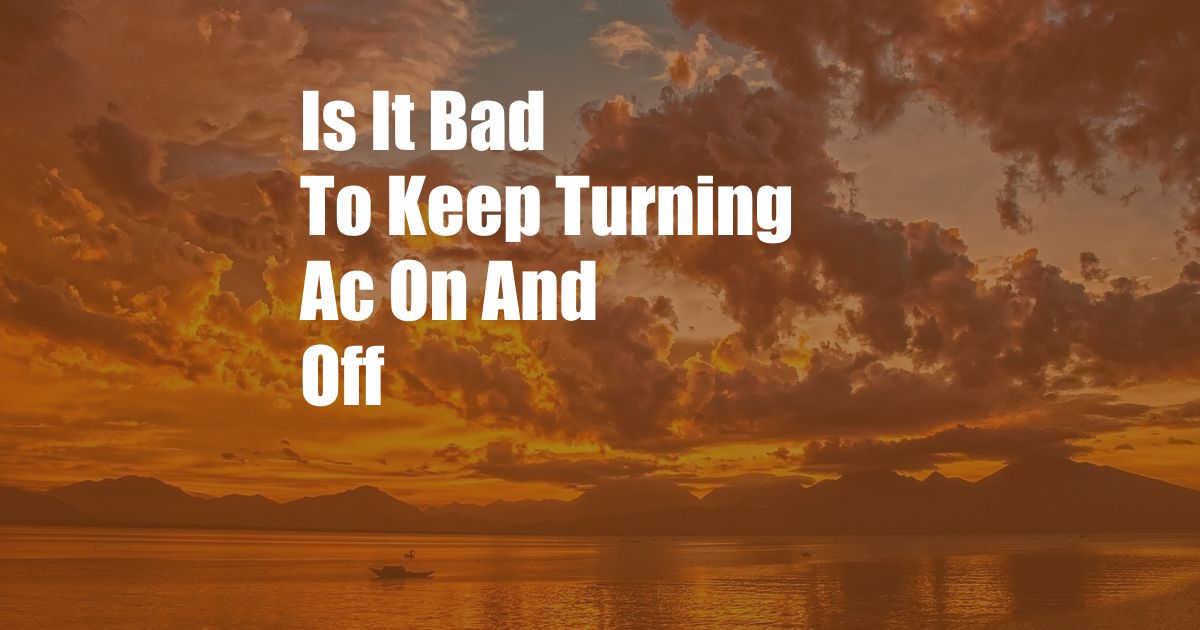
Is It Bad to Keep Turning AC On and Off?
The sweltering summer heat can make us reach for our AC units in desperation. However, there’s an age-old debate about whether it’s better to leave the AC running continuously or turn it off and on as needed. Let’s delve into this topic, exploring the pros and cons of each approach and providing expert advice to help you make an informed decision for your home.
Understanding the Energy Dilemma
Pros of Leaving AC Running
- Consistent Temperature: Maintaining the AC at a constant setting ensures a stable indoor temperature, providing consistent comfort without sudden fluctuations.
- Lower Humidity: AC units not only cool the air but also remove moisture, creating a more comfortable and less humid environment.
- Reduced Indoor Air Quality Problems: Continuous operation of the AC filters the air, reducing dust, pollen, and other allergens, which can benefit people with respiratory issues.
Cons of Leaving AC Running
- Higher Energy Consumption: Keeping the AC running all the time consumes more energy, leading to higher electricity bills.
- Increased Wear and Tear: Continuous operation can put extra strain on the AC unit, potentially shortening its lifespan.
- Overcooling: If the AC is set too low, it can overcool the house, resulting in discomfort and increased energy waste.
Pros of Turning AC On and Off
- Energy Savings: Turning off the AC when not needed can significantly reduce energy consumption, resulting in lower electricity bills.
- Extended Lifespan: By giving the AC unit breaks, you can reduce wear and tear, prolonging its lifespan.
- Flexibility: This approach allows you to adjust the indoor temperature based on your needs, providing greater flexibility in comfort levels.
Cons of Turning AC On and Off
- Temperature Fluctuations: Turning the AC off and on can lead to temperature fluctuations, making it difficult to maintain a comfortable indoor environment.
- Increased Humidity: When the AC is turned off, humidity levels can rise, creating a muggy and uncomfortable atmosphere.
- Increased Energy Usage: Starting the AC from a complete stop requires more energy than maintaining a constant temperature, potentially negating the energy savings.
Expert Tips and Advice
Based on extensive research and industry experience, here are some expert tips to guide your decision:
- Consider Your Lifestyle: If you’re out of the house for extended periods or have an irregular schedule, turning the AC on and off may be more energy-efficient.
- Utilize a Programmable Thermostat: This allows you to pre-program the AC to adjust temperature settings based on your schedule, ensuring comfort when you’re home and saving energy when you’re away.
- Conduct a Home Energy Audit: Identify areas where heat may be escaping or where insulation is lacking. Improving the overall energy efficiency of your home can reduce the load on the AC unit.
- Regular Maintenance: Routine maintenance of your AC unit ensures it operates efficiently, minimizing energy consumption and reducing the need for frequent on/off cycling.
- Consider Your Local Climate: In hot and humid climates, leaving the AC running may be more beneficial for maintaining comfort and indoor air quality.
Frequently Asked Questions
To address common queries on this topic, here’s a list of frequently asked questions and their answers:
- Q: How often should I turn my AC off? A: It depends on your lifestyle and preferences. If you’re away from home for several hours at a time, turning off the AC can save energy.
- Q: Will turning my AC on and off damage it? A: While it’s not recommended to constantly turn the AC on and off, occasional cycling is unlikely to cause significant damage. However, frequent on/off cycling can shorten the lifespan of the unit.
- Q: What temperature should I set my thermostat to when I’m away? A: For energy savings, set the thermostat to a higher temperature when you’re away, such as 78-80°F (26-27°C).
- Q: How can I improve the energy efficiency of my AC unit? A: Regular maintenance, sealing air leaks, and upgrading to a high-efficiency model can enhance energy savings.
Conclusion
The decision of whether to leave your AC running continuously or turn it off and on depends on several factors, including your lifestyle, climate, and energy efficiency goals. By considering the pros and cons outlined above and implementing expert advice, you can make an informed choice that balances comfort, energy savings, and the longevity of your AC unit. Remember, understanding your home’s cooling needs and optimizing AC usage can lead to a comfortable and energy-efficient indoor environment.
Are you interested in learning more about energy-efficient cooling options? Our team of experts is here to answer your questions and provide tailored recommendations based on your specific situation. Contact us today and let’s work together to keep your home cool and energy bills low.